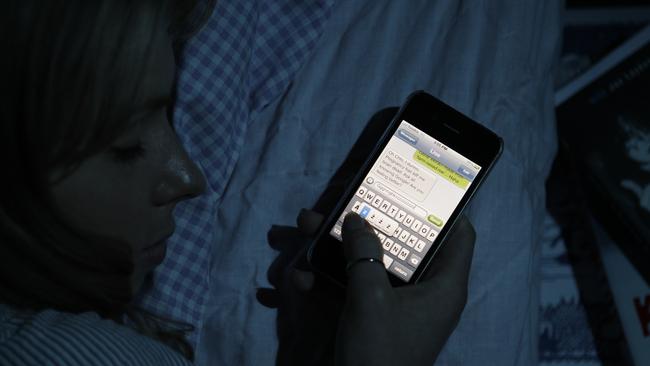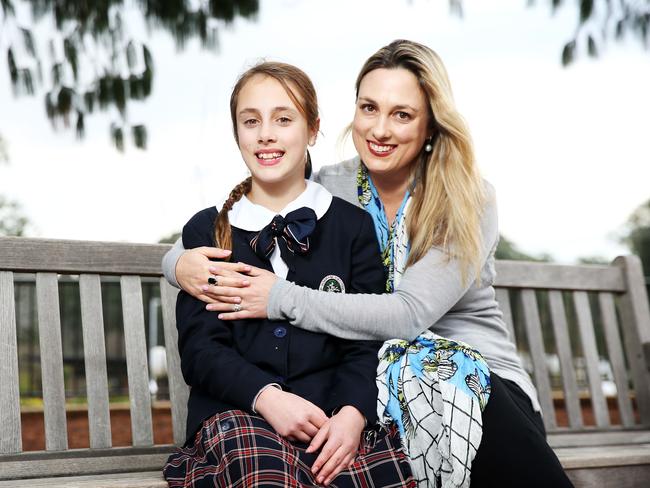Digital devices now keeping most Australian teenagers sleep-deprived
THE number of high school students suffering from serious sleep-deprivation problems has doubled in the last decade because of around-the-clock use of digital devices. And in a bid to stay awake at school, many are taking stimulants.

NSW
Don't miss out on the headlines from NSW. Followed categories will be added to My News.
- Teenagers’ academic results are in free fall
- The truth about teens and antidepressants
- Tech-savvy five-year-olds can’t hold a pencil
- Devices ‘stopping kids from forming memories’
MORE than two-thirds of Australian teens suffer sleep-deprivation in an epidemic forcing rising numbers of high school students to turn to prescription drugs and stimulants as a result.
The number of students suffering from sleep deprivation problems has doubled in the last decade, largely due to around-the-clock use of digital devices.
In a bid to stay awake at school many secondary students are taking stimulants and almost 40 per cent are drinking two or more caffeine and sugar-laden energy drinks every day, researchers have found.

Teachers report students falling asleep in class or not turning up for school at all because they have spent the night internet gaming or on social media and doctors have cited a growing number of teens are taking prescription drugs to restore their levels of the sleep-regulating hormone melatonin.
Blue light emitted by high-powered screens depletes young people’s melatonin reserves to such an extent that many are getting nowhere near the nine hours’ sleep teens need every night.
Adolescent and paediatric sleep physician Dr Chris Seton of the Woolcock Institute of Medical Research said 70 per cent of high school students were now sleep-deprived — a crisis largely caused by the saturation use of digital devices.
Dr Seton said lack of sleep also may have played a part in the declining performance of children in national literacy and numeracy (Naplan) tests.
But he warned that taking melatonin medications such as Circadin would not resolve young people’s sleep problems in the long term.
“Taking melatonin drugs is counter-productive and not a solution — it is like taking Panadol for a headache and then bashing your head against a wall,” he said.
“A lot of mental health disorders are related to sleep but even more worrying is evidence that kids are taking stimulants during the day to stay awake.
“A lot of it is related to the uptake of new electronic devices.
“Korea is the leading country in the world for it (sleep deprivation) but Australia is rated equal third with the United States.”
Other news: Hit-and-run driver strikes man in carpark before trying to hit him again
Child and adolescent psychiatrist Dr Philip Tam said he was aware of young people taking Circadin to counter sleep problems caused by excessive screen use.
“It is better to treat the underlying cause so that healthy sleeping patterns can be developed,” he said.
“The advice for young people is no screen time at least one hour, and preferably two hours, before bed.”
Child and adolescent psychologist Michael Carr-Gregg said children needed 10 hours’ sleep a night and teenagers nine hours.
“Sleep is the single most important biological activity we will ever engage in — it’s about energy conservation, growth and processing memories and learning,” he said.
“Parents need to get their act together. Teachers tell me they (children) are arriving at school very, very tired.”
Wahroonga mother-of-five Louise Limbers said she ensured her older children had a regular sleep routine by stopping their use of digital devices at least an hour before bedtime.
“Two hours would be ideal but that is difficult when they have school assignments due,” she said. “I do notice that moods are affected if they don’t get enough sleep.
“I have observed the kids’ general wellbeing when they have a regular routine especially during school time.”


